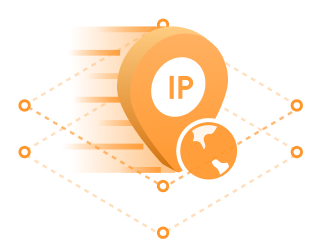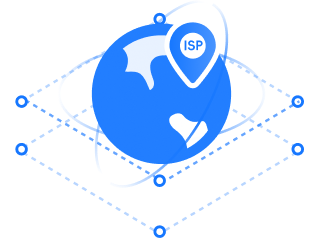As more people and businesses turn to residential proxies for privacy, security, and web scraping purposes, a common question arises: Are residential proxies legal? The short answer is that, in most cases, residential proxies themselves are legal. However, how you use them can make all the difference. Let's explore this in more detail.
What Are Residential Proxies? A Quick Recap
Before we dive into the legalities, let's briefly review what residential proxies are. A residential proxy is an IP address assigned by an Internet Service Provider (ISP) to a household. These IPs are tied to real residential addresses, as opposed to datacenter proxies, which are often recognized as being associated with server farms.
Residential proxies are popular because they make it harder for websites to detect and block the user. They’re used for many legitimate reasons, such as:
· Privacy protection while browsing
· Accessing geo-restricted content (e.g., streaming services, websites with region-based restrictions)
· Web scraping (gathering data from websites)
· Ad verification and price monitoring for businesses
Are Residential Proxies Legal?
The answer to whether residential proxies are legal depends on how they are used, not the technology itself. Here are some scenarios where their legality can vary:
1. Using Residential Proxies for Privacy and Security
If you are using residential proxies for legitimate purposes like privacy protection or avoiding tracking, you're likely within legal boundaries. For example, if you're simply using a proxy to mask your real IP address while browsing the web, or to access content from another country, you’re not breaking any laws. In many countries, internet users have a right to maintain their privacy and use tools like proxies to do so.
However, it's important to note that some websites may still have terms of service (ToS) that prohibit the use of proxies or require specific measures to identify real users. This is where the legal gray area comes in—just because you’re legally entitled to mask your IP doesn’t mean that every website agrees with it.
2. Using Residential Proxies for Web Scraping
Web scraping is one of the most common uses of residential proxies. Businesses or individuals might use residential proxies to gather data from websites for various reasons—like monitoring competitors, checking prices, or conducting market research.
While web scraping itself is not illegal, it can become problematic if:
· The website's terms of service prohibit scraping: Many websites have clauses in their ToS that specifically ban scraping or the use of automated bots. Ignoring these clauses could result in legal action, even if you are using a residential proxy.
· The data scraped is used for malicious purposes: For example, scraping data to engage in identity theft, fraud, or other illegal activities is certainly against the law.
· You overload a website's servers: In some cases, excessive scraping (especially if done rapidly) can be seen as a form of Denial of Service (DoS) or Distributed Denial of Service (DDoS) attack, which is illegal in many places.
The key takeaway here is that scraping data ethically and within the legal limits of a website’s ToS is generally acceptable. However, violating a website’s rules or scraping for malicious purposes crosses into illegal territory.
3. Using Residential Proxies to Access Geo-Restricted Content
Many people use residential proxies to access geo-restricted content, like streaming services (Netflix, Hulu, BBC iPlayer, etc.) or websites that are only available in certain regions. For example, you might want to watch a show that is only available in the United States, even though you're located in another country.
In general, this is not illegal, as you’re simply using a proxy to access content as if you were located in a different region. However, the legality of bypassing geo-restrictions depends on the terms of service of the specific service you're using.
Streaming platforms and websites that have regional restrictions often have clear rules against the use of proxies to bypass these restrictions. For example, Netflix has a strict anti-proxy policy, and while using a residential proxy might technically allow you to access blocked content, it could lead to account suspension if Netflix detects that you're using one.
Important Note: While it’s unlikely you’ll face legal consequences just for using a proxy to watch a TV show, violating the terms of service of a website could lead to your account being banned.
4. Using Residential Proxies for Ad Fraud
Unfortunately, fraudulent activities like ad fraud have become a major concern for digital advertisers. Some individuals or organizations use proxies to simulate traffic or fake ad clicks to make money from ads. This is illegal and is considered a form of online fraud.
If you are using residential proxies for any type of fraudulent or malicious activity (like click fraud, fake reviews, or identity theft), you are definitely crossing into illegal territory. This can lead to serious consequences, including legal action, financial penalties, and even criminal charges in some cases.
Legal Risks and Best Practices
While using residential proxies is generally legal, there are still some important risks to be aware of:
1. Violating Terms of Service
Many websites explicitly forbid the use of proxies in their terms of service. This includes things like scraping, automating actions on the site, or bypassing region locks. Violating these terms might not be a criminal offense, but it could result in your IP being banned, your account being suspended, or your access being blocked.
2. Privacy and Data Protection Laws
In some regions, like the European Union (under the General Data Protection Regulation, or GDPR), there are strict privacy and data protection laws. While residential proxies themselves are not illegal, misusing data or scraping personal information without consent can violate these laws.
3. Local Laws and Regulations
Laws around proxies and internet usage vary by country. What may be legal in one region could be restricted or illegal in another. For example, in countries like China or Russia, the government has strict controls on internet usage, and the use of proxies or VPNs might be heavily regulated or even banned. Always be aware of the laws in your jurisdiction.
In most cases, residential proxies themselves are legal. However, the way you use them plays a big role in determining whether or not you are operating within the law. Whether you're using them for privacy, web scraping, or bypassing geo-restrictions, it’s important to respect the terms of service of the websites you interact with and avoid any illegal activities, such as fraud or excessive scraping.
If you stick to ethical practices and stay within legal boundaries, residential proxies can be a powerful and legal tool for many online activities. Always make sure to understand the rules, stay informed about local laws, and avoid using proxies for malicious or fraudulent purposes.
In the end, if you’re using residential proxies for legitimate reasons and following the rules, you should have no problem staying on the right side of the law.




























